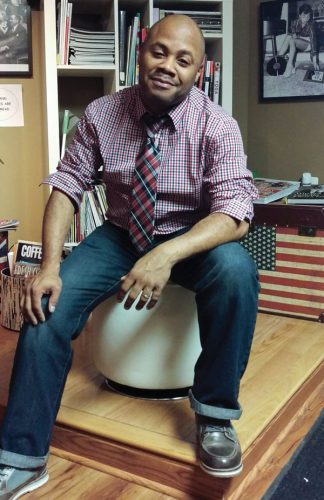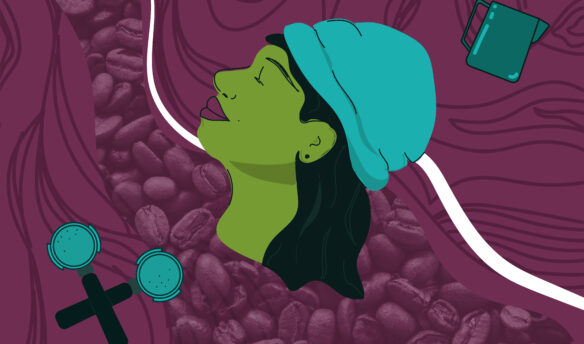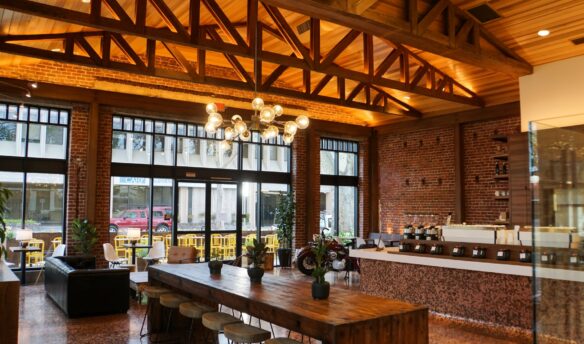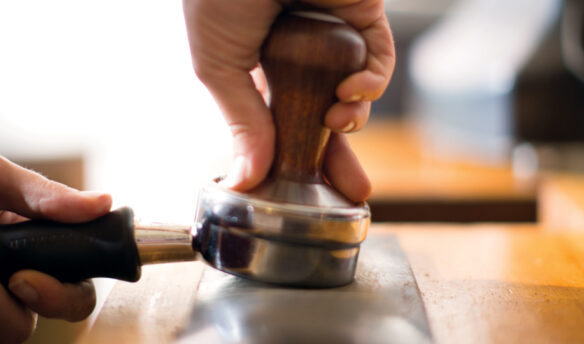The Charm City of Baltimore’s coffee scene is the cat’s meow—literally. One of the city’s newest java joints is Charm Kitty Cafe, which serves coffee and adorable, adoptable felines.
Even without the cute kittens, locally owned coffee shops are popping up all over the city to meet the community’s caffeine cravings.
Norman Loverde, executive vice president of Baltimore Coffee and Tea Co., remembers a lack of coffee shops when his company started in 1992 with partner and president Stanley Constantine. “There was not really anyone else,” he says.
Aside from Loverde in the ’90s, there was just Vaccaro’s in Baltimore’s Little Italy neighborhood offering freshly brewed coffee with its pastries, and Donna’s Coffee Bar in Mount Vernon, which opened with an espresso menu that was ahead of its time back then.
Flash forward to today, coffee is being taken as seriously as Baltimore’s beloved steamed crabs. And Loverde, whose own business has grown with additional retail locations over the years, welcomes the competition.
“Everybody has a niche,” he says. “They do a lot of different things—and they’re a lot younger.”
Argosy Cafe
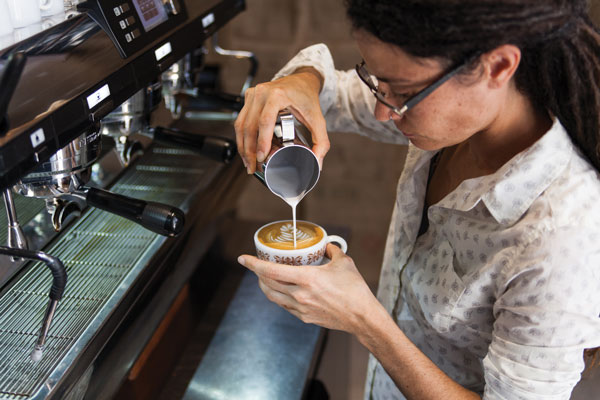
It’s easy to chill out at Argosy Cafe, even while sipping a hot brew. Soul, rock, and funk play on the sound system, the staff is friendly, and the former bank space in a once-bustling Baltimore office building is retro and stylish.
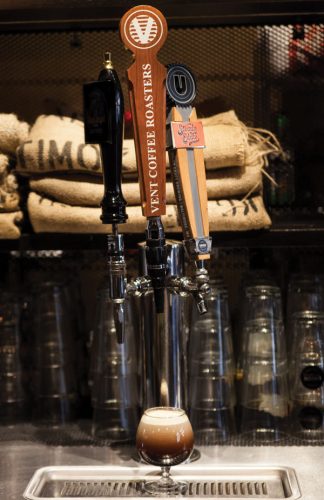
In one corner the roaster hums along as a batch of Ethiopian coffee is overseen by Sarah Walker, the founder of Vent Coffee Roasters and Argosy’s manager.
The Baltimore native brings devotion to her craft, having lived on the West Coast to learn about coffee. She began her training as a barista at Temple Coffee in Sacramento, California; then manager at Bloom Coffee and Tea in Roseville, California; a roaster at Hub Coffee Roasters in Reno, Nevada; and finally returning to her hometown to share her coffee knowledge.
“I missed the grit,” she says about the metropolis known as Charm City. “I can’t imagine living anywhere else.”
Argosy is open for breakfast, lunch, and dinner with a changing menu that includes entrees, burgers, and sandwiches in the afternoon, eggs and pancakes in the morning, all accompanied by single-origin coffees, espresso drinks, nitro cold brew, and teas.
Not hungry or thirsty? No problem. Walker encourages passersby to simply stop in for their daily moment of Zen. “I wanted a place where people could come in and let out what was on their nerves and take on something better,” Walker says. “I wanted a place for people to vent.”
Walker is moving her roastery this year to Union Collective, a manufacturing and retail complex in Baltimore’s Hampden-Medfield neighborhood. But she is not abandoning Argosy. “They’ll still be serving Vent,” she says. “And I’ll be training the baristas.”
Artifact Coffee
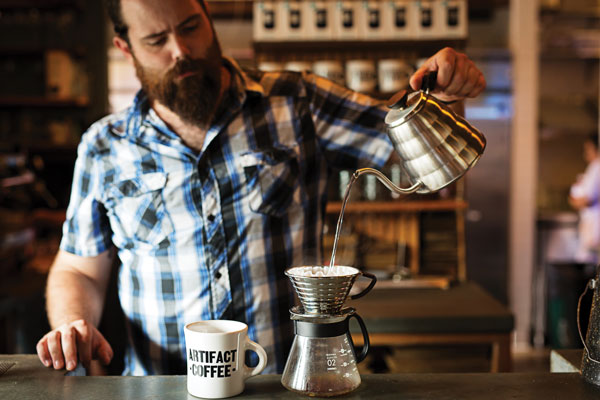
For first-timers, finding Artifact Coffee in the refurbished Union Mill complex can be confusing as you approach the light-rail tracks and the underside of a busy highway. Persevere. The entrance to the parking lot is on your right.
Once inside the rustic stone building in Hampden-Woodberry, you’re greeted by a pleasant hostess who takes your name if you want to sit at one of the coveted tables. A communal table is an option, too. If you’re in a hurry, belly up to the coffee bar staffed by patient, knowledgeable baristas.
 A hipster vibe with lots of plaid shirts and laptops abounds in the charming space with reclaimed wood, shelves of pickled vegetables and canned local tomatoes for sale, twinkling lights, and a blackboard with the offerings of the day.
A hipster vibe with lots of plaid shirts and laptops abounds in the charming space with reclaimed wood, shelves of pickled vegetables and canned local tomatoes for sale, twinkling lights, and a blackboard with the offerings of the day.
The salted caramel latte, presented in a simple white cup with exquisite latte art of a swirling flower, is one of Artifact’s most popular hot beverages, according to general manager Lauren Pavin Jones. In addition to brewed coffee and espresso drinks, the café, which serves Counter Culture Coffee, offers pour-over coffee and Chemex for two.
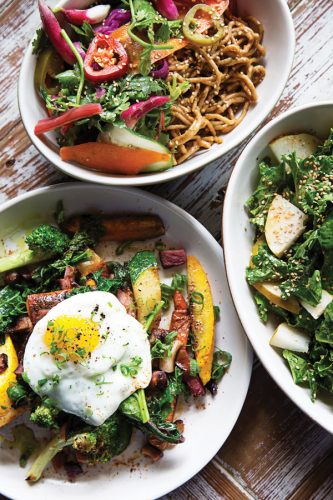
Pavin Jones directs the coffee program at Artifact and another trendy spot, Bird in Hand, in Charles Village. Both cafés are part of the Foodshed restaurant group headed by Spike Gjerde, a James Beard Award-winning chef acclaimed for his farm-to-table restaurant, Woodberry Kitchen, in Baltimore.
Artifact Coffee follows Woodberry’s footsteps with a menu targeting homegrown foods. At lunch, offerings include cream of tomato soup dotted with grilled cheese croutons, and a thick, pulled pork sandwich with apple slaw. Breakfast and dinner are also served.
“We have a strong commitment to local sources, growers, and watermen,” says Pavin Jones. “What you can’t get local is coffee. Coffee brings the community together.” Artifact also pays attention to tea, using Bellocq blends.
(recipe for Artifact’s cascara soda)
NuBohemia
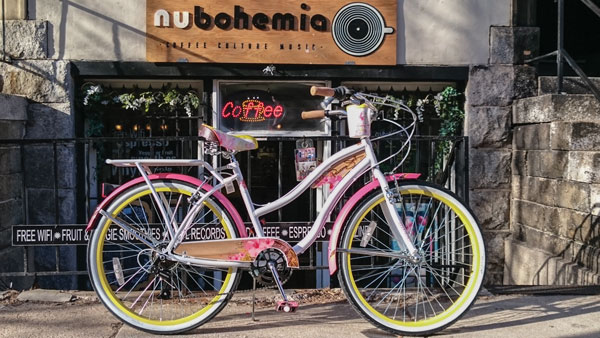
Jay Rags’s dream to own a coffee shop took several years, but when NuBohemia opened in 2014, he was prepared. He relied on contacts from a social-events website he developed, as well as coffee tastings and seminars at which he steeped himself in the world of java.
“I knew how to create the vibe,” says Rags, who transformed a basement in Midtown-Belvedere that not only serves coffee, tea, munchies, and sandwiches, but also hosts art shows, music, and other community activities.
The café’s design aesthetic is eclectic, with mismatched chairs, an inviting settee, colorful art for sale, and a soul-and-R&B playlist to accompany an outdoor view consisting of legs walking past the below-sidewalk gathering spot.
“I take pride in the people I hire behind the counter,” Rags says. “They can relate to any person who comes into the shop.”
A chalkboard advertises “fresh locally roasted Arabica beans from Brazil, Costa Rica, Ethiopia, and Colombia,” but Rags is more interested in the final product, whether it’s an iced latte with white-chocolate flavoring, cappuccino, or mocha macchiato. “We want to market good coffee to customers, not roasters,” he says.
Teas are also in demand with a choice of 11 different kinds in bags and four loose leaf teas that are steeped to order. Rags has found that, “people are as enthusiastic about getting teas as coffee.”
Zeke’s Coffee
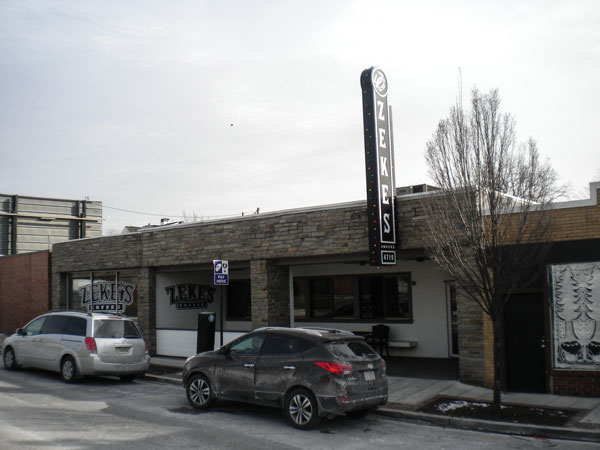
Zeke’s may be the best-known coffee in Baltimore because of its beans christened with city references like Mobtown Espresso, Tell Tale Dark, and Charm City.
What started out as one man’s mission to become a modest small-batch roaster has turned into a family-operated, multi-city business with other locations in Washington D.C., and Pittsburgh, Pennsylvania. Owner Thomas Rhodes got the pot percolating when he sold his first pound of coffee at the Baltimore Farmers’ Market in 2005. Aficionados still fuel up at the seasonal market.
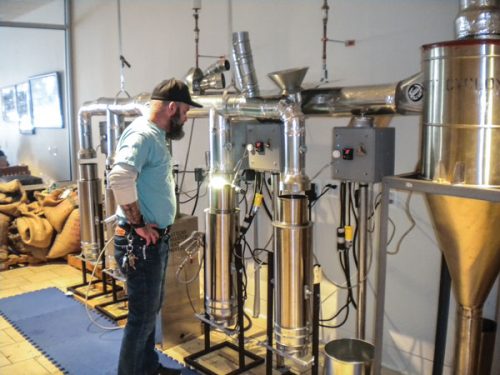
The café—which looks more like a bustling luncheonette than a boutique coffeehouse—draws families, singles, couples, and anyone else looking for a welcoming place to order a cup of joe. “We want to present an unpretentious atmosphere,” Brett Rhodes says.
The café serves breakfast items like bagels and pastries and build-your-own sandwiches for lunch. Hot and cold drinks include brewed coffee, French press, lattes, cold brews, and iced espressos.
“Drip coffee is as popular as ever,” Rhodes says. “Fancy drinks always have a market.”
Customers also wait patiently for preparations that take longer, like pour overs. “Everybody is certainly on the move,” Rhodes says. “The consumer is overwhelmed by new technologies and everything being fast. But they like to step back and take it slow.”
Customers are likely to take a Zeke’s product home when they leave. The rack by the front door is tempting with bags of fresh-roasted beans, Z-cups, chocolate-covered coffee beans, and T-shirts.



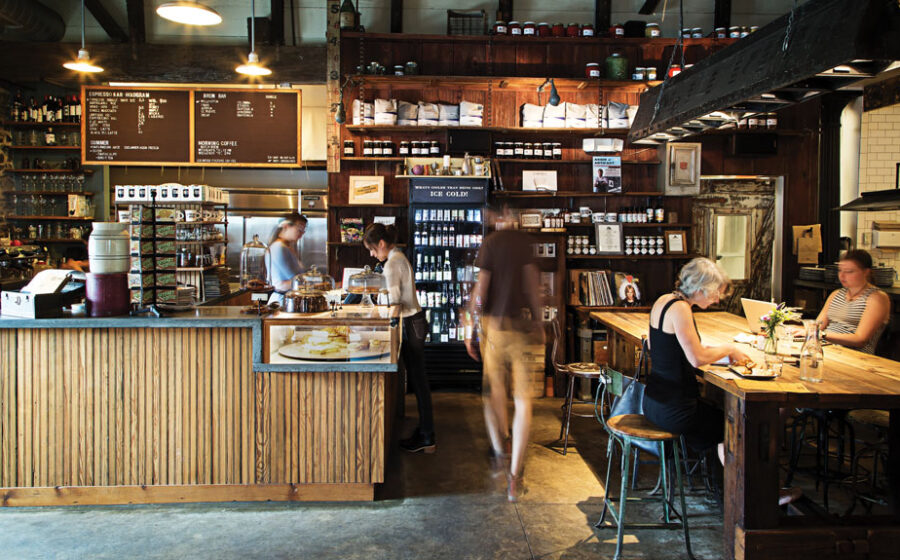
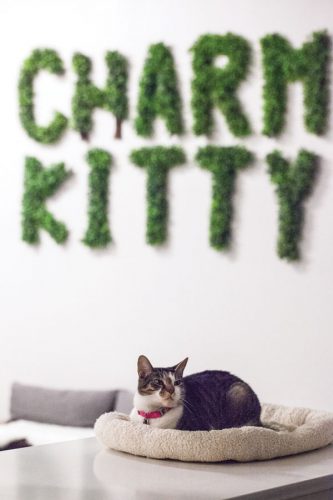

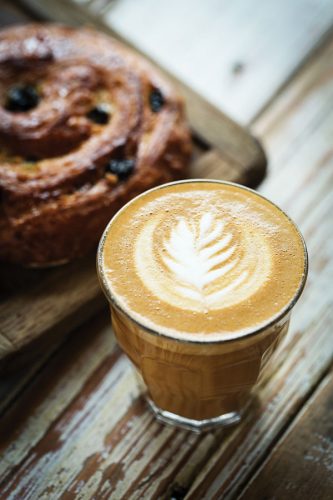 A hipster vibe with lots of plaid shirts and laptops abounds in the charming space with reclaimed wood, shelves of pickled vegetables and canned local tomatoes for sale, twinkling lights, and a blackboard with the offerings of the day.
A hipster vibe with lots of plaid shirts and laptops abounds in the charming space with reclaimed wood, shelves of pickled vegetables and canned local tomatoes for sale, twinkling lights, and a blackboard with the offerings of the day.